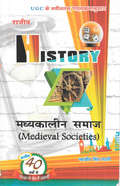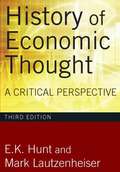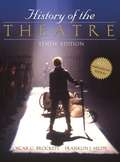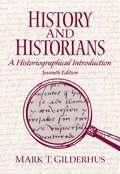- Table View
- List View
History Is in the Land: Multivocal Tribal Traditions in Arizona's San Pedro Valley
by Chip Colwell-Chanthaphonh Robert W. Preucel T. J. FergusonArizona's San Pedro Valley is a natural corridor through which generations of native peoples have traveled for more than 12,000 years, and today many tribes consider it to be part of their ancestral homeland. This book explores the multiple cultural meanings, historical interpretations, and cosmological values of this extraordinary region by combining archaeological and historical sources with the ethnographic perspectives of four contemporary tribes: Tohono O'odham, Hopi, Zuni, and San Carlos Apache. Previous research in the San Pedro Valley has focused on scientific archaeology and documentary history, with a conspicuous absence of indigenous voices, yet Native Americans maintain oral traditions that provide an anthropological context for interpreting the history and archaeology of the valley. The San Pedro Ethnohistory Project was designed to redress this situation by visiting archaeological sites, studying museum collections, and interviewing tribal members to collect traditional histories. The information it gathered is arrayed in this book along with archaeological and documentary data to interpret the histories of Native American occupation of the San Pedro Valley. This work provides an example of the kind of interdisciplinary and politically conscious work made possible when Native Americans and archaeologists collaborate to study the past. As a methodological case study, it clearly articulates how scholars can work with Native American stakeholders to move beyond confrontations over who "owns" the past, yielding a more nuanced, multilayered, and relevant archaeology.
History Madhyakalin Samaj M.A. SEM-I - Kolhan University Chaibasa, Jharkhand: इतिहास लेखन : अवधारणा, विधि एवं साधन एम. ए. – कोल्हान विश्वविद्यालय चाईबासा, झारखंड
by Prof. Mahabir Singh Tyagiविश्वविद्यालय अनुदान आयोग (UGC) द्वारा प्रदत्त मॉडल पाठ्यक्रमानुसार Choice Based Credit सेमेस्टर प्रणाली (CBCS) पर आधारित लोकप्रिय तथा छात्रोपयोगी पुस्तक है। इतिहास मध्यकालीन समाज यह पुस्तक कोल्हान विश्वविद्यालय, चाईबासा झारखंड की एम. ए. 1st सेमेस्टर की कक्षाओं के नवीनतम् पाठ्यक्रमानुसार लघु उत्तरीय तथा वस्तुनिष्ठ प्रश्नोत्तर सहित है। इस पुस्तक में सम्पूर्ण नवीनतम् पाठ्यक्रम, गत वर्षों के सोल्वड पेपर्स, सरल प्रश्नोत्तर रूप और अधुनातम् क्रमबद्ध विषय-सामग्री दी गई है।
History Of Economic Thought: A Critical Perspective
by E. K. Hunt Mark LautzenheiserThe new edition of this classroom classic retains the organizing theme of the original text, presenting the development of thought within the context of economic history. Economic ideas are framed in terms of the spheres of production and circulation, with a critical analysis of how past theorists presented their ideas.
History Of English Literature
by Annamalai UniversityA History of English Literature is an account of the literary works that found their rightful place in the several periods during its history. Of course, along with these works the authors who contributed them come to our mind. However, a little bit of thinking will provoke us to know what it really is and in what way it proposes to explain the various factors involved in 'the making of all these different kinds of literary compositions. While studying the History of English Literature, it is imperative to understand the man and the work created by him. In so doing to ask the question what made him to create such a work is also pertinent. Every great writer brings to bear upon his book the imprint of his personality. His originality and the power of expression make him a real genius in the art. In a historical survey like this the writer's individuality does matter. Several aspects of his creativity and genius show themselves out in the process.
History Of English Literature
by Edward AlbertThe fifth edition of Edward Albert’s History of English Literature, first published in 1979, offers its readers a detailed view of how English literature has evolved through the centuries. Starting from the Old English period to the literature of mid-twentieth century, the book takes a look at how English literature has developed across each period. It talks about the major literary genres of each age, like poetry, prose and drama, their major proponents and offers an extensive list of the notable works published during that period. Special focus has been given to Chaucer, Shakespeare, Milton, Pope and Dryden, whose writings strongly influenced the literary output of their time. Each chapter also contains quotes, together with translations wherever needed, from the many works cited in the text. The book also comes with a broad list of writings under ‘Suggestions for Further Reading’ to guide readers who want to further explore the subject.
History Of The Americas, 1880-1981: IB History Course Book (Oxford IB Diploma Program )
by David Smith Yvonne Berliner Alexis Mamaux Mark Rogers Matt Borgmann Shannon Leggett<P>Drive critical, engaged, high level learning and skills. Developed with the IB, this Course Book equips learners to analyze and articulate complex historical concepts and contexts, strengthening performance and potential. Enabling advanced understanding, the student-centred approach actively builds, refines and perfects higher level skills. <P>- Cover the new syllabus in the right level of depth, with rich, thorough subject content from across the Americas for topics 10-17 for Paper 3 <P>- Developed directly the with IB for the new syllabus first examined 2017 <P>- Truly engage learners with topical, relevant material that convincingly connects learning with the modern, global world <P>- Streamline your planning, with a clear and thorough structure helping you logically progress through the syllabus <P>- Build the advanced-level skills learners need for Paper 3, with the student-led approach driving active skills development and strengthening exam performance <P>- Integrate Approaches to learning with ATLs like thinking, communication, research and social skills built directly into learning <P>- Help learners think critically about improving performance with extensive examiner insight and samples based on the latest exam format
History Of The U. S. Volume 1 Beginnings to 1877
by William Jay Jacobs Lorna C Mason Robert P LudlumIn this history of the American people, we begin with the Native Americans and conclude with the Civil War and its aftermath. We show how the territory and people of the United States reflect an Indian, British, African, French, and Spanish heritage. We try to show the drama of the past, the agonies as well as the joys. We try to show the consequences of decisions made, and of decisions not made. Most of all, we try to make the past meaningful to you as you prepare yourself for life in the twenty-first century.
History Of The United States
by Christian G. Appy Houghton Mifflin Company Staff Lorna C. Mason Thomas V. DibaccoHistory of the United States was designed with three goals in mind:<P> 1. To provide thorough coverage of American history from earliest times to the present, with special emphasis on the twentieth century.<P> 2. To identify the major themes in American history and explain their importance at each stage in the development of the United States.<P> 3. To convey a sense of the breadth of experiences and influences that have shaped the United States.
History Of the Theatre (Tenth Edition)
by Oscar G. Brockett Franklin J. HildyKnown as the "bible" of theatre history, Brockett and Hildy's History of the Theatre is the most comprehensive and widely used survey of theatre history in the market. This 40th Anniversary Edition retains all of the traditional features that have made History of the Theatre the most successful text of its kind, including worldwide coverage, more than 530 photos and illustrations, useful maps, and the expertise of Oscar G. Brockett and Franklin J. Hildy, two of the most widely respected theatre historians in the field. As with every edition, the text reflects the current state of knowledge and brings the history of theatre up to the present. This tenth edition continues to provide the most thorough and accurate assessment of theatre history available.
History Social Science: Communities (California Edition)
by Herman J. Viola Sarah Witham Bednarz Carlos E. CortesThis book is a research-based curriculum that focuses on developing students' conceptual understanding and skills through step-by-step instruction.
History Solved Paper I Competitive Exam
by Indic TrustThis is a compilation of questions answer of Civil Service Examination History Solved Paper I.
History Text Book Intermediate First Year - Telangana Board
by Telangana State Intermediate Education CircleThis is the prescribed text book for the students of Intermediate First Year in the state of Telangana for the subject History in Telugu Medium
History Volume 1 class 11 - Tamil Nadu Board
by Government Of Tamil NaduThe subject to be discussed in the lesson is introduced Leads the students to animated audio, video aids for getting experiential learning Provides additional information related to the subject in boxes to stir up the curiosity of students Infographs - Visual representations intended to make the complex simple and make the students grasp difficult concepts easily.
History Volume 1 class 11 - Tamil Nadu Board - SCERT: வரலாறு தொகுதி 1 தமிழ்நாடு அரசு மேல்நிலை முதலாம் ஆண்டு
by Government Tamil NaduThe subject to be discussed in the lesson is introduced Leads the students to animated audio, video aids for getting experiential learning Provides additional information related to the subject in boxes to stir up the curiosity of students Infographs - Visual representations intended to make the complex simple and make the students grasp difficult concepts easily.
History Volume 2 class 12 - Tamil Nadu Board - SCERT
by Accessable E-Book Production UnitThis History Volume2 the branch of knowledge dealings with past events.a continus,systematic narrative of past events as relating to a particular people,country,period and persons.
History Volume 2 class 12 - Tamil Nadu Board - SCERT: தமிழ்நாடு அரசு மேல்நிலை இரண்டாம் ஆண்டு வரலாறு தொகுதி - 2
by Scertஇந்த வரலாறு புத்தகம் பகுதி இரண்டு முதற் பகுதியின் தொடர்ச்சியாகும். மேலும் வரலாற்று நிகழ்ச்சிகளை மேலும் தெரிந்து கொள்ளலாம்.
History and Historians: A Historiographical Introduction (7th Edition)
by Mark T. GilderhusThis book presents a survey of Western historiography from ancient times to the present and shows how historians have grappled with the past in a search for meaning and how history as a body of knowledge has served different goals and purposes.
History and Political Science Class 9 - Maharashtra Board
by Maharashtra State Bureau of Textbook Production and Curriculum ResearchCreated by the Maharashtra State Bureau of Textbook Production and Curriculum Research, the textbook for class 9 History and Political Science textbook is based on the new syllabus. The book reviews the development that has taken place in India in the social, cultural and other areas since 1961. This textbook will help you lay the foundation for the competitive exams you might take in the future or for higher education in history. As part of the Political Science syllabus, you have to study the main currents in world events since 1945, the evolution of India’s foreign policy, our security systems and the challenges before them today. We also discuss diplomatic relations between India and other countries, the United Nations, India’s contribution to the peacekeeping efforts of the United Nations, etc.
History class 10 - JK Board
by The Jammu and Kashmir State Board of School EducationLearning of History aims at the cultivation of a scientific and humanistic approach and forward outlook towards life. History is not about the story of great men and their conquest but it should contribute in the widening of the mental horizons of the students based on how men have lived and progressed through ages. In the light of the NCF-2005, the social and cultural aspects of the history of J&K and Ladakh have been included in the book. It is hoped that through the perception of local history, the students are in a position to understand the local history.
History class 11 - GSTB - 23
by Gujarat State Board of School TextbooksThe book HISTORY STANDARD 11 of GSEB is a Gujarati-medium textbook that covers the history of India from the 16th to the 20th centuries. It discusses the major events and developments that took place during this period, including the rise and fall of the Mughal Empire, the Maratha challenge to the Mughals, the establishment of British rule in India, the growth of the Indian National Movement, and the attainment of independence in 1947. The book is written in a clear and concise style, and it is well-illustrated with maps, charts, and photographs. It is an essential resource for students of Indian history.
History class 11 - Meghalaya Board
by Prof. Shaukat Ullah KhanA book in History prescribed for use as a textbook in class XI by the Executive Chairman, Meghalaya Board of School Education, Tura, Meghalaya, vide Notification No. 15 dated Tura, the 28th March 2008.
History class 11 - Tamil Nadu Board - SCERT: வரலாறு மேல்நிலை முதலாம் ஆண்டு
by State Council of Educational Research and Training Tamil Naduவரலாற்றுப் பகுதியில் நாம் அரியப் போகும் சில விஷயங்கள். பண்டைய இந்தியா அதன் சிறப்பம்சங்கள் மற்றும் பண்பாடுகள், பிரதேச முடியரசுகளின் தோற்றமும் புதிய மதப்பிரிவுகள் உருவாக்கமும், குப்தர், மௌரியக் காலங்கள், முகலாய பேரரசுகள், பண்பாட்டு ஒருமைப்பாடுகள் முதலியனவாகும்
History class 12 - GSTB
by Gujarat State Board of School TextbooksThe textbook for the 12th standard history course by the Gujarat State Board offers a comprehensive overview of India's modern history. It covers significant events and movements from the 18th to the 20th centuries, emphasizing the impact of European colonization and the Indian struggle for independence. The book explores the arrival of various European powers, their interactions with local economies, and the resulting socio-political changes. It highlights key figures and events in the Indian independence movement, illustrating the country's journey from colonial subjugation to sovereignty. The text is supported by archival materials and scholarly research, providing a detailed and factual representation of this period.
History class 12 - Tamil Nadu Board
by Government TamilnaduThe subject to be discussed in the lesson is introduced Leads the students to animated audio, video aids for getting experiential learning Provides additional information related to the subject in boxes to stir up the curiosity of students Infographs - Visual representations intended to make the complex simple and make the students grasp difficult concepts easily.









